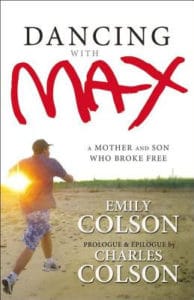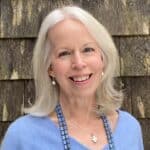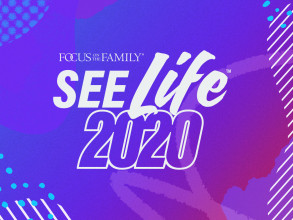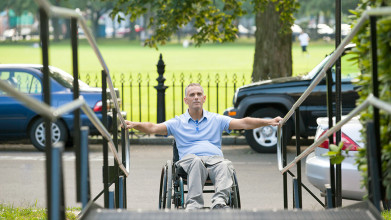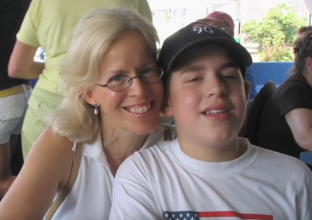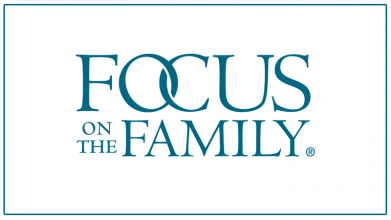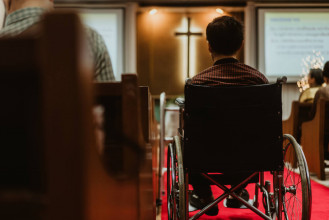Excerpt:
Ms. Emily Colson: The voice of the crowd is very loud today – isn’t it? – telling us which lives have value, which lives do not, pushing people aside – the disabled, the elderly, the prisoner, the unborn, the unwanted, the disruptive, the inconvenient.
End of Excerpt
John Fuller: Emily Colson offering a stark reminder about why it’s so important for us in the Christian community to advocate for people that our culture deems “inconvenient.” Today on Focus on the Family, you’ll hear more from Emily. She was our special guest at a pro-life event that we hosted in Tampa, Florida, a number of months ago. Your host is Focus president and author, Jim Daly, and I’m John Fuller.
Jim Daly: John, I so appreciate Emily’s bold witness and pro-life ministry. But most of all, I love her heart as a mom and that comes through all the time. When you meet her one-on-one, she just exudes that delight of being a mom. Some of our listeners already know Emily’s story. She’s been raising her son, Max, on her own for 26 years. And it’s inspiring how she’s embraced her motherhood role, finding beauty and the glory of God in her son, who has a severe disability. And that’s what being pro-life is all about. Living out your faith in tangible ways. And here at Focus on the Family, we invite you to do the same thing by participating in our free See Life 2020 event next month – September 26th. We’ve created a powerful online program featuring top-notch Christian speakers, great music and so much more. The star of our show, of course, will be a 4D ultrasound of a baby, alive in the womb.
John: It’s going to be awesome and we have all the details online. We also have a pledge that we’d ask you to sign – #loveeveryheartbeat – which is a commitment to pray for the growing pro-life movement and to support those who are facing unexpected pregnancies, and to share your pro-life values with others, encouraging them to get involved as well. So, find details about See Life 2020 and sign the pledge at focusonthefamily.com/broadcast.
Jim: All right, John, let’s get to the wonderful conversation we recorded with Emily Colson. As you’ll see and hear, I was struggling a bit with a head-cold at the time, so forgive me for that, but the Lord certainly was with us that night. Here’s more on today’s Focus on the Family.
(APPLAUSE)
John: Emily is the daughter of the late Chuck Colson. She is an author and speaker, a very, very persuasive advocate for special needs families. And, uh, her son, Max, who has autism, is the subject of a book – and I mean this, uh, Emily. When I read this, I don’t think there was a chapter I could finish without crying at some point. You have captured such a beautiful story. Dancing with Max: A Mother And Son Who Broke Free. Um, stop by the website to get your copy
Jim: John, I mean, there is a reason it strikes a chord with you.
John: Yeah.
Jim: Why don’t you share that with the audience?
John: Well, our son was diagnosed with autism when he was 2. That was 14 years ago. And it’s been a really wild and unpredictable journey for us. Um, I had the chance to sit down with Chuck Colson – the late Chuck Colson – and talk about his love for Max and, uh, the beauty that Max’s life portrayed, and I was just deeply riveted by Chuck’s perspective. That’s been a guiding force these past years as we’ve had a lot of struggles.
Jim: Well, and I was going to mention, what I love about Emily Colson is the way she’s a mom.
John: Yeah.
Jim: Emily, welcome.
Emily: Thank you. Such a joy to be here – really, to be with the two of you, such a joy to be here with all of you here in Tampa.
Jim: They’re kind of loud.
Emily: They’re awesome!
(CHEERING)
Jim: (Laughter) All right. Isn’t that fun?
Emily: When I told Max I was coming here, I said, “What do you want people to know about autism?” And he paused for a moment, and he said, “Love.”
Jim: Oh, man.
John: Mm.
Emily: That’s all he said. He doesn’t have, uh, a lot of language. He’s not conversational. And I thought, “Max, that’s exactly it.”
Jim: Yeah.
John: Hmm.
Emily: That’s the best thing we could do.
Jim: Boy, that sounds like it’s right from the heart of God.
Emily: Mm-hmm.
Jim: I mean, that’s what he tells us is most important – right? – love.
Emily: To love – absolutely.
Jim: Love the Lord and love your neighbor. So, that is perfect. Emily, uh, we’re gonna get into your story with Max in a moment, but I want to start with, um, a tragic story about a woman named Gillian, who, um, has raised a son with Down syndrome for more than 50 years. This was in the newspaper a while back. Gillian’s motherhood journey has been overwhelming and painful. She expressed that. Gillian says she loves her son and wants to protect him, but she also wishes every day that she had aborted him.
(AUDIENCE REACTION)
Jim: How does that strike you when you hear that from someone who is struggling? I want to recognize that.
Emily: Absolutely.
Jim: This is painful for her, obviously.
Emily: Absolutely.
Jim: But to live in that tension where – and I think her son is 50 years old now.
Emily: Yeah, I think I saw in that article, uh, 47, so close to 50. She – they’ve had a long journey. Um, I’ve been at this almost 30 years. Max is about to turn 29. And, uh, it breaks my heart when I read that article. It really broke my heart.
Jim: Why?
Emily: I understand. I genuinely resonate with this struggle. I understand how overwhelming and how difficult this can be. I don’t resonate with the conclusion that if I just didn’t have this child, my life would be perfect. We’re – we’re all really vulnerable to that, right? We have something happening in our lives, and we think, “If I just didn’t have blank, my life would be perfect.” Well, it’s a broken, fallen world, and it will not be perfect.
Jim: Yeah.
Unidentified audience member: Amen.
Emily: In the past couple of years, we’ve really gone through some deep challenges. I think if we’ve talked about this article four years ago, I would have talked about Max’s beauty, and I still see Max’s beauty. But I think, with the struggles becoming even deeper, what I’ve seen is more of God’s beauty in it. And the – the Scripture that we heard earlier, the Lord is close to the brokenhearted.
Jim: Yeah.
Emily: That’s what I know. That’s what I’ve felt. Uh, I think that so many families feel that sense of struggle. It’s really tremendous. I think, first of all, this is a heart cry to the church to say, we need to step in with families living with disabilities. That is number one, because the isolation that we feel as families is more disabling than the disability. We feel like we have the whole thing on our shoulders and there isn’t anybody to help, and – it just gets bigger and bigger…
Jim: Yeah.
Emily: …And bigger. And I don’t know this woman’s situation. I don’t know anything about her. But I do have to wonder, did she have anybody supporting her? Was there anybody beside her? Was there – was there anybody even calling to say…
Jim: Yeah.
Emily: “…Are you okay? We’re with you”?
Jim: Or to help her.
Emily: Uh, or to help her – to help her…
Jim: And that’s key.
Emily: …In any way? Because it’s pretty overwhelming…
Jim: Yeah.
Emily: …If you don’t have anybody…
Jim: Yeah, let me…
Emily: …That’s going to step in.
Jim: Let me also interject this. I think one of the things that I noticed in our culture, especially Western culture – and Ray Vander Laan, who does our That the World May Know series. He’s a Jewish scholar. I’ve been to Israel with him. He’s awesome. He just – the Scriptures light up when he unfolds it a little differently, more from a Jewish perspective, an Eastern Orthodox perspective, if I could say it that way. So, the Scriptures just pop. And he said to me, “The problem is Hellenistic and Roman leftovers in the Western world because what we pursue is leisure and comfort.”
Emily: Comfort.
John: That’s our highest goal.
Emily: Absolutely.
Jim: And so, I just wonder how much of that plays into a family that’s disrupted with a child that has special needs?
Emily: If we believe that we’re entitled to a comfortable, perfect life, we are gonna be incredibly disappointed. This is not a comfortable, perfect life. Jesus said, “In this world you, will have trouble,” right? It wasn’t a, “Maybe you’ll have trouble.” “You will have trouble, but take heart, for I’ve overcome the world.”
Jim: Yes.
Emily: I think about it as, uh – in Tampa, you – you know about these big storms that come in, these hurricanes that come in. I’m a Boston girl. We watch the weather because we get a lot of crazy storms that come in. And when you watch, you always see a weatherman that’s out there in the storm, in the slicker, getting pushed over. The camera’s falling over right there in the midst of the storm. And that’s how we feel because that’s what we can see, is that storm. But then they switch over, and you get the radar picture, and you get the whole overview. And what I have to remember in those very, very hard moments when the rain is pouring and I’m out there in the slicker is that God has this glorious aerial view where He is doing something that I won’t know in this world.
Jim: Yeah.
Emily: Sometimes we get a little picture. We get…
Jim: Yeah.
Emily: …Little glimpses of what He’s doing. But we can’t fully understand. But our trust in His sovereignty, our trust in His goodness, that He is for us, that He would not allow autism into our lives unless He had a purpose and a plan that could be used for His glory.
Jim: Hmm.
Emily: So, I know that about beautiful Max.
John: Hmm.
Emily: I know God has fashioned him in such a way…
Jim: Yeah.
Emily: …To bring glory to our Heavenly Father.
Jim: Emily, uh, before we move on – yeah, give her a hand.
(APPLAUSE)
Emily: Yeah.
Jim: It’s well said. You know, before we move on, I want to be able to make sure that person that is suffering in that way hears your – not only your empathy but maybe one or two things they can do. Maybe they don’t have a relationship with Jesus Christ, and they’re listening to the Focus program right now. Because they’re trying to get some good marriage or parenting advice. But here it is, the distinction between a person that has that deep-rooted faith, where they can stand in that storm and say, “There’s something of a greater purpose being accomplished here than my wants and needs.”
Emily: Mm-hmm.
Jim: Is that…
Emily: Absolutely. And I don’t remember exactly the quote from Corrie ten Boom. “There is no pit so deep that Jesus cannot reach into it and find us.” It’s…
Jim: Right.
Emily: …Something like that.
Jim: So, that – I mean, the point in that is if you’re struggling in that space and you don’t know the Lord, that’s the place to start. And I want to make sure that you know you can contact Focus on the Family.
Emily: Definitely.
Jim: We have caring Christian counselors who will talk with you. We have resources for you. That’s where to start because that will become the bedrock for everything moving forward.
Emily: Mm-hmm.
(APPLAUSE)
Jim: All right. Now we’re still going to get into the nitty-gritty. Emily, uh, you have a story about complaining to God at 2 a.m. one night, and, uh, what was going on in that, uh, specific situation? What did you learn from that experience, the 2 a.m. experience?
Emily: The 2 – oh, I’ve had a bunch of 2 a.m….
Jim: Yeah, okay.
(LAUGHTER)
Emily: …Experiences.
Jim: Well, and, you know, again, vulnerability is great. That’s what I love about you. It’s probably why people connect to you because you’re open with your pain.
Emily: Yeah, yeah. It – you know, I have been a single mom since Max was just 18 months old.
Jim: What happened? Where did dad go?
Emily: Well, um, there are a lot of challenges that come in when you have a child that is not developing, that’s, uh, not hitting any of those milestones. Max had what we thought was colic. It – it really wasn’t colic. Now we know, oh, that’s autism. But we didn’t know it back then. He just cried all the time. And, uh, I loved him like crazy. I just couldn’t – I couldn’t take my eyes off him. I couldn’t stop hugging him. And here, all he did was scream all the time.
John: You are listening to Focus on the Family with Jim Daly. And I’m John Fuller. Our guest, Emily Colson, joined us at a live pro-life event a few months ago. And Emily is sharing stories from her book, Dancing with Max, which describes her joys and struggles in raising her special needs son. And you can learn more about this book and how to get an audio copy of our entire conversation with Emily which includes our broadcast next time at focusonthefamily.com/broadcast. And now, here’s more from Emily Colson on today’s Focus on the Family.
Jim: So, that 2 a.m. event – what happened?
John: Yeah.
Emily: We have had a couple of very challenging years, and, uh, that happens with autism. It can go very well at times and then it can become very difficult. And we’ve come through – I say through because I feel like we’re lifting up out of it. We’ve come through some very, very difficult years, and on top of it, Max ended up getting stomach flu. Now, I’ll really spare you the details.
(LAUGHTER)
Emily: But I’m just going to say that I was genuinely debating would it be easier to continue cleaning or just to bulldoze the house and start over?
(LAUGHTER)
Jim: Yeah, right. It was a mess.
Emily: You fill in the blanks. Yes.
Jim: That’s fair.
Emily: Max was, uh, upstairs, finally getting into bed, 2 o’clock…
Jim: Oh, no.
Emily: …In the morning, and I was tired. I was deep tired. I was years’ worth of tired. And I began to ask God – I don’t really think it was a pity party. I think it was – it was actually a pretty rational discussion and I began to ask God, “So, how much is enough to serve?” Is there a quota, that maybe you could hit a quota and then I don’t know what’s on the other side, but I thought I – I really think I’m getting pretty close to that quota.
(LAUGHTER)
Emily: Max is kind of in bed, and then he begins asking me for things, which he loves to do when he gets into bed. I become the bellhop. “I need water. I need this. I need that. Mom, I lost my picture.” Well, I had my hand on the light switch, ready to turn it off, and I just couldn’t wait to go downstairs and have a few minutes by myself. And then I heard Max say, “Mom, will you wash…” And I cut him off, and I said, “Max, I have cleaned everything. You have had three showers. I have cleaned the sheets. I’ve cleaned the walls. I’ve cleaned the rugs. I think I’ve cleaned the neighbors’ rugs. Now go to sleep” – really wasn’t my best mom moment. Max was unfazed.
Jim: (Laughter).
Emily: And he sat up, and he smiled. And he asked me something he has never asked me in his life. And he said, “Mom, will you wash my feet?”
Audience: Oh.
Jim: Gee.
Emily: And it caught me so off guard, and it was as if Jesus had just stood right beside…
Jim: Yeah.
Emily: …Me and shown me a picture of the night before He was crucified, the night He was betrayed. He was in the upper room with his Disciples, and He wanted to show them the full extent of His love.
Jim: Yeah.
Emily: So, he got up. He poured a basin of water. He tied a towel around His waist. And then the Lord of Lords, the King of Kings got down on a filthy floor, showing us how to live, showing us how to love. I think of the Scripture from John 13:34. Jesus said, “In that moment, a new command I give you. Love one another as I have loved you so you must love one another. By this, all men will know that you are my Disciples if you love one another.”
Audience: Amen.
Emily: I want to tell you that I found the softest towels and the sweetest-smelling soap and had the privilege of washing my son’s feet, praying over him, blessing him. He has since asked me a number of other times to wash his feet.
(LAUGHTER)
Emily: And every time, we say together, “Blessed are the feet of those who carry the gospel of peace.”
Jim: Yeah, wow.
(APPLAUSE)
Jim: You know, in your book Dancing with Max, you describe how you were desperately trying to find a way to fix your son. I so relate to this. That would be my temptation. What do I need to do? Take him to how many specialists and continue to work on the problem. But you weren’t getting much help from medical or educational professionals. In fact, you described how one classroom supervisor labeled Max and that kind of stuck in your heart. What happened?
Emily: Oh, yeah, I – I – it was a huge battle. It really was. When Max was diagnosed, it was around 1 in 10,000 children had autism. Now we’re at 1 in every – is it 59? Do I have that right?
John: 59 or 60, yeah.
Emily: Yeah. Um, so it’s increased dramatically. The battle is still there.
Jim: Right.
Emily: The struggle to find services, to find support is still – still very, very similar. I remember that moment when I was in a meeting with all of his teachers and specialists, and, uh, we were talking about teaching Max handwriting. And he could write his name. He could write Max. And when you see the cover of Dancing with Max, that is his signature. That is a mark of victory.
(APPLAUSE)
Emily: As we talked about how wonderful it was that Max could write his first name, we talked about how do we begin teaching him to writing his last name and teaching him to write other things? And – and that specialist just cut me off and said, essentially, “Well, Max is severely disabled,” and kind of smirked and said, “Why don’t we move on to other things?” I was so crushed that the people who were supposed to be teaching him and supposed to believe in him and see his potential and possibilities were already shutting the door on my very young son to say, “Why even bother?”
Jim: Wow. Yeah.
Emily: It was so disheartening because we need people who are going to believe in our kids and believe in possibilities, see their potential.
Jim: Yeah, and that had to be so disheartening as a single mom. And my goodness, I mean, what do you turn to? Where do you go?
Emily: Heartbreaking. Heartbreaking.
Jim: I mean, what do you do?
Jim: You also share the story of how you were eventually able to communicate with Max. You did something called – I think it’s picture talks. So, what…
Emily: Oh, this is the coolest thing.
Jim: Oh, good. What is it?
John: It is cool.
Emily: So, I – I spent about 20 years as a creative director, graphic designer, artist.
Jim: In your spare time.
Emily: (Laughter) About 12 years before Max was born, I was a creative director. And then I tried to keep up with it for a while afterwards. I always felt like I kind of fell short. Like, God, what do you really want me to do with this gift you’ve given me? It never felt like I was using it in a way that was significant enough. Well, when Max was about 9-years-old, he was really struggling to understand cause and effect. And so, I began to draw out little sequences of cause and effect and little storyboards so that he could see it and process it and make sense of it. And very quickly, Max began to ask for certain pictures. He began to ask me to draw things. And he began to tell me things he could never say before because he was seeing his words fall on the page. And, course, I’m a quick draw because I’m an artist. I would draw whatever he said, pictures of it, and write down his words. And he began to tell me memories…
Jim: Oh, man.
Emily: …Things he was afraid of, things he’d never been able to say ever. Now we have about 1,400, 1,500 of these picture talks…
John: Ah.
Emily: …That stay out all the time in our living room. It is our living room. They’re open to different pages.
Jim: Yeah.
Emily: And that’s become Max’s diary, his processing, his comfort, his peace.
Jim: Help me – help me – give me an example of one just to help me.
Emily: The first one that absolutely shocked me that I knew God was doing something remarkable – the first one is when he said, “Mom, draw a picture of Joanne’s blue sports car.” And I thought, “I don’t know who you’re talking about.” Max is almost 10 at the time. And he began to talk and talk. And I began to realize that he was talking about a babysitter that took him out when he was 2 years old.
(AUDIENCE REACTION)
John: Mm.
Emily: And took him out – she wasn’t supposed to – put him in the front seat.
(LAUGHTER)
Jim: He was – he was ratting out the babysitter! But he remembered it from 2.
Emily: He remembered all the details. I drew him in – he said, “In the front seat.” Now I’m sweating…
Jim: Yes, right!
Emily: …I knew – a neighbor told me she had taken Max out and knew that Max wasn’t supposed to go anywhere. And, uh, there he is in the front seat. I draw the seat belt. He said, “No seat belt.” I’m like, ohhh!
(LAUGHTER)
Emily: …Erase the seat belt. Oh, it’s getting worse.
Jim: I think we had that same babysitter!
(LAUGHTER)
Emily: He knew the house they went to. He – I said, “What did you do when you went to the house?” He said, “I sat on the floor and cried.” I was like, “Oh, my goodness.” So, I knew this was unlocking something in Max. When he was about 16, he wanted to drive by that house. He remembered the address.
(AUDIENCE REACTION)
Emily: He was two-years-old.
Jim: Oh, my goodness.
Emily: Two-years-old. The beautiful part of this is I think God gave me the gift of art and creative communication, and then He gave me the son that would need that gift…
Jim: Need it. Wow.
Emily: …To become his voice. Only God can write that.
Jim: That’s awesome. Only God. Yeah.
(APPLAUSE)
John: This is Focus on the Family with Jim Daly. And we’ve been featuring a conversation recorded with Emily Colson at a pro-life event where she shared some really powerful stories about her son, Max.
Jim: What’s amazing about Emily is that she never gives up on Max – no matter how difficult or challenging life gets. She’s always there in his corner and, uh, she acknowledges the struggles, but she also found great value in her precious son because she was looking at him through God’s eyes. That’s a powerful example for all of us who claim to be followers of Christ. Do we have that same commitment to those who are not valued and appreciated in today’s society? People with special needs like Max? Or the elderly? Orphans? And pre-born children who are at risk of abortion? I mean, they are the most forgotten group of all.
John: Hmm.
Jim: We all have a sacred responsibility to protect human life, created in God’s image. But it’s not enough to simply believe this. We need to stand up and be counted, and let our voices be heard by our government leaders and our culture as a whole. We are pro-life!
Jim: Yeah. We are and that’s why Focus on the Family is hosting See Life 2020 which is a special online event on Saturday, September 26th. That’s about is about 6 weeks from now, Jim.
Jim: It is, John. And we hope everyone listening will join and sign our pledge. It’s #loveeveryheartbeat. And this is your chance to be part of something big. To help transform hearts and minds about the critical issue of life.
John: You can learn more about See Life 2020 and, uh, sign that pledge when you go to focusonthefamily.com/broadcast. Or call 800, the letter A and word FAMILY. And I trust you were moved by the conversation we had with Emily Colson. We just so enjoy talking with her. We have copies of her book available. It’s called Dancing with Max: A Mother and Son Who Broke Free.
Jim: And we want to say thank you to those who can support the ministry with a gift of any amount by sending them a copy of the book. And there has to be somebody – if it’s not you that needs to be encouraged as a mom, there is somebody in your orbit that would benefit from the story of Emily Colson. So, contact us today, send a gift, and get a copy of Emily’s wonderful book.
John: Donate and get your copy of Dancing with Max when you call 800, the letter A and the word FAMILY. That’s 800-232-6459. Or you can donate and get the book at focusonthefamily.com/broadcast. And coming up next time, you’re going to hear more from Emily about raising her special needs son, Max.
Teaser:
Emily: God’s goal for Max is not that he become more like other young men, God’s goal for Max is that he be more like Jesus.











